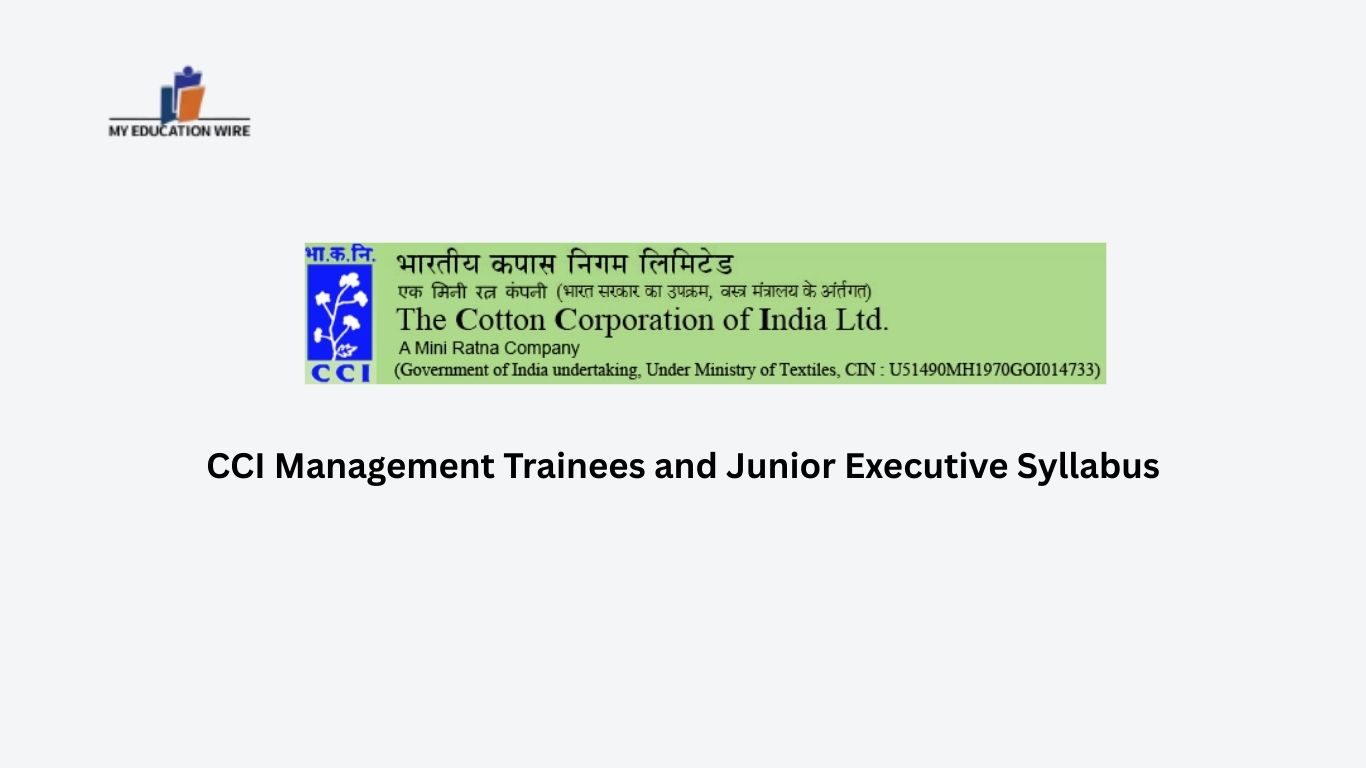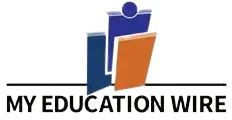CCI Management Trainees and Junior Executive Syllabus: The application form is open for applying to management trainees in various departments and Junior commercial executives. The candidates who are applying must know the syllabus for the entrance test. The qualifying marks that a candidate would secure in the entrance test. We have given you the syllabus for the same, you can check and prepare accordingly. The syllabus is similar to the topic one has studied in the last qualifying exam. It would not be very difficult for you to prepare
Qualifying Marks
The minimum qualifying percentage prescribed for the Computer Based Test for different categories is as under: Category Minimum qualifying percentage
- UR/EWS/OBC 40%
- SC/ST/PwBD/Ex-Servicemen 35%
MANAGEMENT TRAINEE (MARKETING)
The paper would be in 5 parts with 120 Objective MCQ type to be attempted in 120 minutes. 1 mark would be given for each correct answer and 0.25(1/4) marks deducted for each wrong answer.

Note: The level of the paper will be consistent with the educational qualification prescribed for each post
| Section name (Nature of Questions) | Marks per item | No. of Items |
| Unit-I: General English- Articles, Prepositions, vocabulary, Reading and Comprehension, synonym, jumbled sentences etc. | 01 Mark | 15 Ques. |
| Unit-II: Reasoning – Syllogism, coded inequalities, direction and distance, ordering and ranking, blood relation, Data interpretation, coding and decoding, deductive logic, data sufficiency, series compilation, puzzles, pattern completion etc. | 01 Mark | 15 Ques. |
| Unit-III: Quantitative Aptitude – Ratio and proportion, Time and work, speed and distance, percentages and averages, profit, loss and discount, probability, Simple and Compound Interest, etc. | 01 Mark | 15 Ques. |
| Unit-IV: General Knowledge – Indian geography, Indian trade & Economy, current affairs- World & India, scientific research, awards, sports , World geography etc. | 01 Mark | 15 Ques. |
| Unit-V: Subject Knowledge – Indicative syllabus | 01 Mark | 60 Ques. |
| Agricultural & Food PolicyAgricultural FinanceMarketing of Agricultural InputsStrategic Food MarketingManagement for Agribusiness ProjectsMarket Research and Information SystemsInternational Agri-Food TradeValue Chain Management – Applications in AgribusinessCINE: Understanding Creativity, Innovation, Knowledge, Networks And EntrepreneurshipFood and Agri-business International Strategies and OrganizationsMicro Finance ManagementFood Supply Chain ManagementAnalyzing and Building CompetenciesCarbon FinancePublic PolicySocial Entrepreneurship: Innovating Social ChangeSales and Distribution Management For AgricultureAgribusiness Entrepreneurship Agribusiness Leadership Agricultural Futures and Option Markets Agricultural Markets and Pricing Economics of Food Quality Applied Agricultural Trade and Policy Analysis Managing Sustainability Managing Energy Businesses Agricultural marketing, Trade & Practices Farm Power and Machinery Agricultural Entomology Crop Pest and their Management Agricultural Microbiology Soil Microbiology Principles of Agricultural Agronomy Field crops Weed Management Organic Farming Dimension of Agricultural Farming Cotton procurement, cotton area, production, yield and cotton scenario both domestic and international cotton. | ||
CCI Management Trainees and Junior Executive Syllabus
MANAGEMENT TRAINEE (ACCOUNTS)
The paper would be in 5 parts with 120 Objective MCQ type to be attempted in 120 minutes. 1 mark would be given for each correct answer and 0.25(1/4) marks deducted for each wrong answer.
Note: The level of the paper will be consistent with the educational qualification prescribed for each postSection name (Nature of Questions) Marks per item No. of Items Unit-I: General English- Articles, Prepositions, vocabulary, Reading and Comprehension, synonym, jumbled sentences etc. 01 Mark 15 Ques. Unit-II: Reasoning – Syllogism, coded inequalities, direction and distance, ordering and ranking, blood relation, Data interpretation, coding and decoding, deductive logic, data sufficiency, series compilation, puzzles, pattern completion etc. 01 Mark 15 Ques. Unit-III: Quantitative Aptitude – Ratio and proportion, Time and work, speed and distance, percentages and averages, profit, loss and discount, probability, Simple and Compound Interest etc. 01 Mark 15 Ques. Unit-IV: General Knowledge – Indian geography, Indian trade & Economy, current affairs- World & India, scientific research, awards, sports , World geography etc. 01 Mark 15 Ques. Unit-V: Subject Knowledge – Indicative syllabus 01 Mark 60 Ques.
Accounting
Accounting Standards, Introduction to Accounting Standards, Overview of Accounting
Standard AS 1: Disclosure of Accounting Policies, AS 2: Valuation of Inventories
AS 3: Cash Flow Statements, AS 6: Depreciation Accounting, AS 7: Construction Contracts, AS 9: Revenue Recognition, AS 10: Accounting for Fixed Assets, AS 13: Accounting for Investments, AS 14: Accounting for Amalgamation – Financial statements of Company- Preparation of financial statements- Cash flow Statement (Profit and Loss Account, Balance Sheet and Cash Flow Statement)-Profit/Loss prior to incorporation- Accounting for Bonus Issue, Amalgamation and Reconstruction, Average Due Date and Account Current, Self-Balancing Ledgers, Financial Statements of Not-for-Profit Organizations, Accounts from Incomplete Records,
Accounting for Special Transactions
(a) Hire purchase and installment sale transactions (b)Investment accounts
- Insurance claims for loss of stock and loss of profit. Issues in Partnership Accounts Accounting in Computerized Environment.
Business Laws
The Indian Contract Act, 1872, the Negotiable Instruments Act, 1881, The Payment of Bonus Act, 1965, The Employees’ Provident Fund and Miscellaneous Provisions Act, 1952, The Payment of Gratuity Act, 1972.
Company Law
The Companies Act, 2013, Preliminary, Prospectus, Share and Share capital.
Cost Accounting
Introduction to Cost Accounting, Materials, Labor, Overheads, Non-Integrated Accounts, Methods, Job and Batch, Contract, Operating, Process and Operation, Standard Costing, Marginal Costing, Budgets and Budgetary Control
Financial Management
Scope and Objectives of Financial Management, Time Value of Money, Financial Analysis and Planning, Financing Decisions, Types of Financing, Investment Decisions, Management of Working Capital.
Tax
The Income-tax Act, 1961, Basic concepts, Residential status and scope of total income, Incomes which do not form part of total income ( Sec 10), 5 Heads of income, Provisions of Clubbing, Set-off and carry forward of losses, Deductions from gross total income, Computation of total income and tax payable. Provisions concerning Advance tax and TDS, Provisions for filing of return of income, highlights of Goods and Services Tax Act (GST).
Advanced Accounting
Conceptual Framework for the Preparation and Presentation of Financial Statements: Accounting Standards
AS 4: Contingencies and Events occurring after the Balance Sheet Date
JUNIOR COMMERCIAL EXECUTIVE
The paper would be in 5 parts with 120 Objective MCQ type to be attempted in 120 minutes. 1 mark would be given for each correct answer and 0.25(1/4) marks deducted for each wrong answer.
Note: The level of the paper will be consistent with the educational qualification prescribed for each postSection name (Nature of Questions) Marks per item No. of Items Unit-I: General English- Articles, Prepositions, vocabulary, Reading and Comprehension, synonym, jumbled sentences etc. 01 Mark 15 Ques. Unit-II: Reasoning, Syllogism, coded inequalities, direction and distance, ordering and ranking, blood relation, Data interpretation, coding and decoding, deductive logic, data sufficiency, series compilation, puzzles, pattern completion etc. 01 Mark 15 Ques. Unit-III: Quantitative Aptitude – : Ratio and proportion, Time and work, speed and distance, percentages and averages, profit, loss and discount, probability, Simple and Compound Interest, etc. 01 Mark 15 Ques. Unit-IV: General Knowledge – Indian geography, Indian trade & Economy, current affairs- World & India, scientific research, awards, sports , World geography etc. 01 Mark 15 Ques. Unit-V: Subject Knowledge – Indicative syllabus 01 Mark 60 Ques.
- Agricultural Marketing, Trade & Practices
- Farm Power and Machinery, Agricultural Entomology
- Crop Pests and Their Management, Agricultural Microbiology
- Soil Microbiology
- Principles of Agricultural Agronomy, Field Crops
- Weed Management Organic Farming
- Dimension of Agricultural Farming
- Cotton procurement, cotton area, production, yield, and cotton scenario, both domestic and international cotton.
JUNIOR ASSISTANT (COTTON TESTING LAB)
The paper would be in 5 parts with 120 Objective MCQ type to be attempted in 120 minutes. 1 mark would be given for each correct answer and 0.25(1/4) marks deducted for each wrong answer.
Note: The level of the paper will be consistent with the educational qualification prescribed for each postSection name (Nature of Questions) Marks per item No. of Items Unit-I: General English- Articles, Prepositions, vocabulary, Reading and Comprehension, synonym, jumbled sentences etc. 01 Mark 15 Ques. Unit-II: Reasoning, Syllogism, coded inequalities, direction and distance, ordering and ranking, blood relation, Data interpretation, coding and decoding, deductive logic, data sufficiency, series compilation, puzzles, pattern completion etc. 01 Mark 15 Ques. Unit-III: Quantitative Aptitude – : Ratio and proportion, Time and work, speed and distance, percentages and averages, profit, loss and discount, probability, Simple and Compound Interest, etc. 01 Mark 15 Ques. Unit-IV: General Knowledge – Indian geography, Indian trade & Economy, current affairs- World & India, scientific research, awards, sports , World geography etc. 01 Mark 15 Ques. Unit-V: Subject Knowledge – Indicative syllabus 01 Mark 60 Ques.
CCI Management Trainees and Junior Executive Syllabus
1. Fundamentals of Electrical Engineering
Resistance, Inductance, Capacitance – measurement, working, testing
Current, Voltage, Power, Energy – definitions and significance
- Kirchhoff’s Law
- Magnetic Materials
- Electromagnetic Induction
- Self and Mutual Induction
2. Digital Circuits
- Number System
- Logic Gates and ICs
- Boolean Algebra
- Combinational Logic Circuits
- Sequential Logic Circuits
3. Basic Electronics
- Working of a diode
- Working of a transistorBJT part number and troubleshootingFunctionality checks of electronic componentsTroubleshooting techniques of analog circuitsField Effect Transistor – terminals and functionIC 741 – Functionality of each pin
- IC 555 – Functionality of each pin
4. Power Electronics
- Power Electronic Devices
- Thyristor – identification techniques and working
- Turn-On and Turn-Off Methods of Thyristors
5. Control System
- Elements of Control Systems
- Feedback CharacteristicsPID Controller workingServomotor – functionality
- Stepper motor – working
6. Sensors
- Basics of Sensors
- Resistance Temperature Detector – RTD
- Ultrasonic sensor
- Light sensor
- Gas sensor
- Motion sensor
7. Microprocessor and Microcontroller
- 8085 Architectures
- 8086 Architecture
- 8051 Architecture
- Assembly language programming in 8085 and 8086
- Embedded C programming in 8051
- Interfacing IO modules to 8051 like ADC, switches, LEDs, DC Motor etc.
